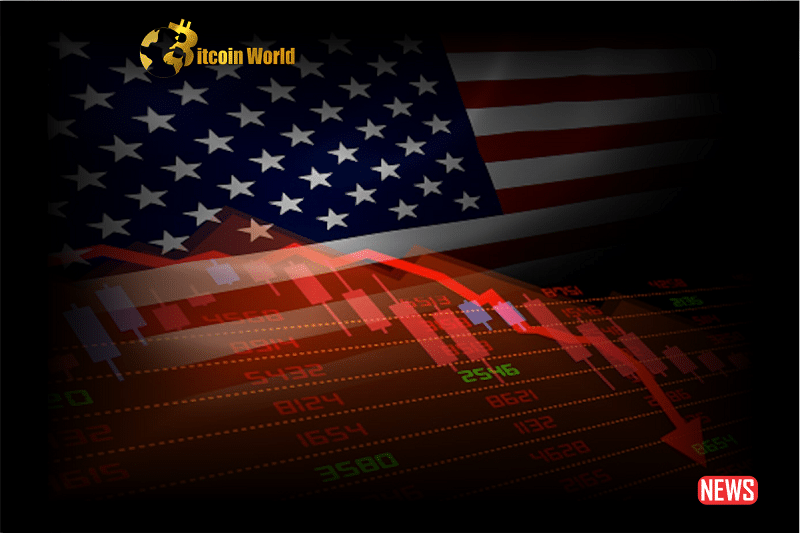Is the American economy heading for a downturn? Renowned economist Steve Hanke has raised concerns about a potential recession in the United States, pointing to a significant slowdown in economic growth. Let’s dive into the details of his prediction and the factors driving this outlook.
Why is Steve Hanke Predicting a Recession?
Hanke, a widely followed economist with a substantial presence on Twitter (over 600,000 followers!), recently highlighted the dramatic deceleration in the US economy’s growth. According to data from the Bureau of Economic Analysis (BEA), the economy grew at an annualized rate of just 1.1% in the first quarter of 2023. This is a stark contrast to the 2.6% growth experienced in the final quarter of 2022.
Hanke’s core argument centers around the Federal Reserve’s handling of the money supply. He believes the sharp decline in economic growth is a direct consequence of the Fed’s actions, or perhaps inaction, regarding the money supply. In his own words, the looming recession is due to the Fed’s “refusal to pay attention to the money supply increase.”
The Numbers Don’t Lie: Examining the Money Supply (M2) and the Fed’s Balance Sheet
To understand Hanke’s perspective, let’s look at the data:
- Money Supply (M2): According to Yahoo Charts, the M2 money supply has surged from $15.41 trillion in 2020 to a staggering $20.80 trillion at the time of this writing.
- Federal Reserve’s Balance Sheet: During the same period, the Fed’s balance sheet has more than doubled, expanding from $4.14 trillion to $8.56 trillion.
This significant expansion of both the money supply and the Fed’s balance sheet is a key point in Hanke’s analysis. He suggests that this rapid increase, if not managed correctly, can lead to economic instability.
Is the Federal Reserve Aware of the Risks?
Interestingly, concerns about a potential recession aren’t limited to external economists. Even within the Federal Reserve system, voices are acknowledging the possibility of an economic downturn.
Neel Kashkari, President of the Minneapolis Federal Reserve Bank, reportedly stated earlier this month that a recession is a distinct possibility given the ongoing financial pressures on the US economy. He even suggests that the Fed’s own restrictive monetary policies, implemented over the past year to combat inflation, might be a contributing factor to the potential slowdown.
Key takeaway from Kashkari: “It is possible that our monetary policy actions, as well as the tightening of credit conditions as a result of the banking stress, will lead to an economic downturn.”
What Does This Mean for You?
The prospect of a recession can be unsettling. Here’s a breakdown of potential impacts:
- Job Market: Recessions often lead to increased unemployment as businesses slow down hiring or even implement layoffs.
- Investments: Stock market volatility and potential declines in asset values are common during economic downturns.
- Consumer Spending: As uncertainty rises, consumers may reduce spending, further impacting economic activity.
- Business Growth: Companies may face challenges in securing funding and experience reduced demand for their products or services.
Navigating the Uncertainty: Actionable Insights
While predicting the future is impossible, understanding the potential risks allows for better preparation. Here are some actionable insights:
- Stay Informed: Keep track of economic indicators and expert analysis from reliable sources.
- Review Your Finances: Assess your financial situation and consider building an emergency fund.
- Diversify Investments: A well-diversified portfolio can help mitigate risk during market downturns.
- Focus on Long-Term Goals: Avoid making rash decisions based on short-term market fluctuations.
- For Businesses: Consider stress-testing your business model and exploring strategies for cost optimization.
The Bottom Line: A Period of Economic Vigilance
Steve Hanke’s recession prediction, coupled with acknowledgments from within the Federal Reserve itself, underscores a period of economic uncertainty. The interplay between the Fed’s monetary policy, the growth of the money supply, and broader economic conditions will be crucial in determining the future trajectory of the US economy. While a recession isn’t a certainty, the current signals warrant careful attention and proactive preparation. Staying informed and understanding the potential implications will be key to navigating the economic landscape ahead.
Disclaimer: The information provided is not trading advice, Bitcoinworld.co.in holds no liability for any investments made based on the information provided on this page. We strongly recommend independent research and/or consultation with a qualified professional before making any investment decisions.




